Mood:
Topic: 026) Graf von Luxemburg 1968
LINK: DOWNLOAD
Updated: Saturday, 11 December 2010 4:25 PM CET
Post Comment | Permalink | Share This Post
| « | June 2009 | » | ||||
| S | M | T | W | T | F | S |
| 1 | 2 | 3 | 4 | 5 | 6 | |
| 7 | 8 | 9 | 10 | 11 | 12 | 13 |
| 14 | 15 | 16 | 17 | 18 | 19 | 20 |
| 21 | 22 | 23 | 24 | 25 | 26 | 27 |
| 28 | 29 | 30 | ||||
LINK: DOWNLOAD
Studio Recording, Rome 1962
Mimi - Mirela Freni
Rodolfo - Nicolai Gedda
Musetta - Mariella Adani
Marcello - Mario Sereni
Conducting Thomas Schippers
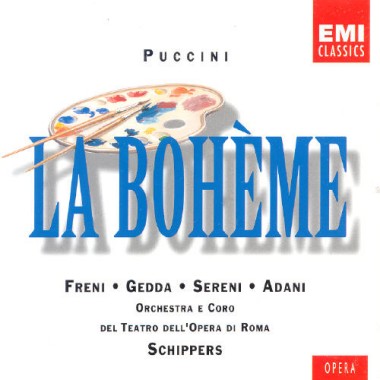
I posted a wrong link before. Here is now a new link. I put both CDs in one archive.
Fra Diavolo ....... Nicolai Gedda
Lord Cockburn ..... Rémi Corazza
Lady Pamela ....... Jane Berbié
Lorenzo ........... Thierry Dran
Mathéo ............ Jules Bastin
Zerline ........... Mady Mesplé
Giacomo ........... Michel Trempont
Beppo ............. Michel Hamel
Francesco ......... Michel Marimpouy
Un Soldat ......... Régis Ducrocq
Ensemble Choral Jean Leforge
Orchestre Philharmonique de Monte-Carlo
Marc Soustrot, conductor
Recorded: Monte-Carlo, Salle Garnier, 20-26 Sept 1983 & 13 June 1984
SYNOPSIS:
--------
The original of the story of "Fra Diavolo“is to he found in Lesueur’s opera, “La Caverne,” afterwards arranged as a spectacular piece and produced in Paris in 1808 by Cuvellier and Franconi, and again in Vienna in 1822 as a spectacle-pantomime, under the title of "The Robber of the Abruzzi.“In Scribe’s adaptation the bandit, Fra Diavolo, encounters an English nobleman and his pretty and susceptible wife, Lord and Lady Allcash, at the inn of Terracina, kept by Matteo, whose daughter Zerlina is loved by Lorenzo, a young soldier, on the eve of starting to capture Fra Diavolo when the action of the opera begins.
In the first scene the English couple enter in great alarm, having narrowly escaped the robbery of all their valuables by Fra Diavolo’s band. The bandit himself, who has followed them on their journey in the disguise of a marquis, and has been particularly attentive to the lady, enters the inn
as Lord Allcash has been reproving his ‘wife for her familiarity with a stranger. A quarrel ensues in a duet of a very humorous character (“I don’t. object”). Upon the entrance of Fra Diavolo, a quintet (“Oh, Rapture unbounded!”) occurs, which is one of the most effective and admirably harmonized ensembles Auber has ever written. Fra Diavolo learns the trick by which they saved the most of their valuables, and, enraged at the failure of his band, lays his own plan to secure them. In an interview with Zerlina, she, mistaking him for the Marquis, tells him the story of Fra Diavolo in a romanza (“On yonder Rock reclining”), which is so fresh, vigorous, and full of color, that it has become a favorite the world over. To further his schemes, Fra Diavolo makes love to Lady Allcash and sings a graceful barcarole to her (“The Gondolier, fond Passion’s Slave”), accompanying himself on the mandolin. Lord Allcash interrupts the song, and the trio, “Bravi, Bravi,” occurs, which leads up to the finale of the act. Fra Diavolo eludes the carbineers, who have returned, and they resume their search for him, leaving him unmolested to perfect his plans for the robbery.
The second act introduces Zerlina in her chamber about to retire. She first lights Lord and Lady Allcash to their room, a running conversation occurring between them in a trio (“Let us, I pray, good wife, to rest”), ‘which is one of the best numbers in the work. Before Zerlina returns to her chamber, Fra Diavolo and his companions, Beppo and Giacomo, conceal themselves in a closet, and, somewhat in violation of dramatic consistency, Fra Diavolo sings the beautiful serenade, “Young Agnes,” which had been agreed upon as a signal to his comrades that the coast was clear. Zerlina enters and after a pretty cavatina (“ ‘T is To-morrow”) and a prayer, charming for its simplicity (“Oh, Holy Virgin”), retires to rest. The robbers, in attempting to cross her room, partially arouse her. One of them rushes to the bed to stab her, but falls back awestricken as she murmurs her prayer and sinks to rest again. The trio which marks this scene, sung pianissimo, is quaint and simple and yet very dramatic. The noise of the carbineers returning outside interrupts the plan of the robbers. They conceal themselves in the closet again. Zerlina rises and dresses herself. Lord and Lady Allcash rush in en déshabillé to find out the cause of the uproar. Lorenzo enters to greet Zerlina, when a sudden noise in the closet disturbs the company. Fra Diavolo, knowing he will be detected, boldly steps out into the room and declares that he is there to keep an appointment with Zerlina. Lorenzo challenges him, and he promises to give him satisfaction in the morning, and coolly effects his escape. One of his comrades, however, is captured, and to secure his own liberty agrees to betray his chief.
The third act introduces Fra Diavolo once more among his native mountains, and there is the real breath and vigor of the mountain air in his opening song (“Proudly and wide my Standard flies”), and rollicking freedom in the rondeau which follows it (“Then since Life glides so fast away”). He exults in his liberty, and gleefully looks forward to a meeting with Lord and Lady Allcash, which he anticipates will redound to his personal profit. His exultation is interrupted by the entrance of the villagers arrayed in festival attire in honor of the approaching wedding ceremonies, singing a bright pastoral chorus (“Oh, Holy Virgin! bright and fair”). The finale of the act is occupied with the development of the scheme between Lorenzo, Beppo, and Giacomo, to ensnare Fra Diavolo and compass his death; and with the final tragedy, in which Fra Diavolo meets his doom at the hands of the carbineers, but not before he has declared Zerlina’s innocence. This finale is strong and very dramatic, and yet at the same time simple, natural, and unstudied. The opera itself has always been a favorite, not alone for its naturalness and quiet grace, but for the bright and even boisterous humor, which is displayed by the typical English tourist, who was for the first time introduced in opera by Scribe. The text is full of spirit and gayety, and these qualities are admirably reflected in the sparkling music of Auber. How well it was adapted for musical treatment is shown by the fact that “Fra Diavolo” made Auber’s reputation at the Opera Comique.

LINK: DOWNLOAD
Live performance from Aix-en-Provence, 1954
Teresa Stich-Randall - Konstanze
Nicolai Gedda - Belmonte
Carmen Prietto - Blonde
Michel Sénéchal - Pedrillo
Raphael Arië - Osmin
Chorus: Choeurs du Conservatoire de Paris
Orchestra: Orchestre de la Société des Concerts du Conservatoire Paris
Conductor: Hans Rosbaud
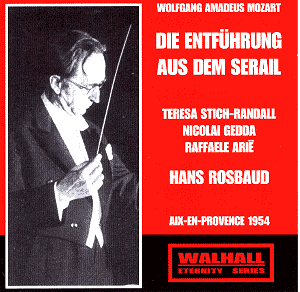
SYNOPSIS
ACT I. Turkey, 1700s. Pasha Selim has bought three Europeans from pirates - Constanze, a Spanish woman of good family; Blonde, her English maid; and Pedrillo, servant of Constanze's fiancé, Belmonte. Belmonte has traced them to a seaside palace, where Constanze has become the pasha's favorite and Pedrillo the gardener. Blonde has been given as a gift by the pasha to his overseer, Osmin. Belmonte's first encounter is with Osmin, who acts polite until Belmonte mentions Pedrillo, the custodian's rival for Blonde. He drives Belmonte away and then rails at Pedrillo, who has come in hopes of making peace with him. Belmonte returns to find his former servant, who tells him the pasha loves Constanze but will not force himself on her. Pedrillo will try to arrange a meeting between Constanze and Belmonte and an escape by boat with Blonde, if they can get past Osmin. In hiding, Belmonte yearns for Constanze, who soon appears with Pasha Selim. When the pasha asks her why she is always depressed by his courtship of her, Constanze replies she cannot forget her love for her fiancé from whom she was separated. After she leaves, Pedrillo introduces Belmonte to the pasha as a promising young architect. Selim welcomes him and, departing, arranges a conference for the next day. Osmin bars the way when Belmonte and Pedrillo try to enter the palace, but he is confused easily, and the two foreigners march him around in circles. Dizzy, Osmin does not notice they have gained access.
ACT II. In a garden, Blonde confounds Osmin with her cleverness and faces him down when he threatens her. Constanze finds Blonde and complains of her sad state, which does not improve when the pasha again asks her to marry him. She proudly refuses, preferring torture, even death. When they have gone, Blonde and Pedrillo dance into the garden, discussing their plan of escape: they will get Osmin drunk, and all four lovers will leave on Belmonte's ship. Later, Pedrillo goes about his business, finding Osmin cooperative, though drinking wine is against the Moslem religion. Thoroughly inebriated, the fat man weaves away with the bottle, leaving the coast clear for Belmonte to meet Constanze. Their reunion is shared by Blonde and Pedrillo.
ACT III. Just before midnight, Pedrillo places a ladder against the ladies' window and sings a serenade, the signal for escape. But he wakes Osmin, who is not too hung over to realize what is going on and takes them all to the pasha, who is angry. Belmonte suggests the pasha collect a handsome ransom from his wealthy family, the Lostados. At this, the pasha realizes that Belmonte is the son of an old enemy, the man who exiled him from his own country. But eventually he decides that rather than take blood for blood he will repay evil with good, freeing Constanze and Belmonte, even Blonde and Pedrillo. This does not sit well with Osmin, who will lose Blonde, but he is promised other rewards. The grateful lovers praise their benefactor as they prepare to set sail.
LINK: DOWNLOAD
LINK: DOWNLOAD
I fixed the links which were not working.
Live performance from the Paris opera, 1975, conducting Sir Charles Mackerras
Faust - Nicolai Gedda
Marguerite - Mirela Freni
Mephistopheles - Roger Soyer
Valentin - Tom Krause
Wagner - Jean-Louis Soumagnas
Siebel - Renée Amphan
Dame Martha - Jocelyne Taillon
Angel - Catherine Bresson
Leila, priestess (Soprano) - Janine Micheau
Nadir, fisherman (Tenor) - Nicolai Gedda
Zurga, leader of the fishermen (Baritone) - Ernest Blanc
Nourabad, high priest (Baritone) - Jaques Mars
Chorus and Orchestra of the Théâtre National de l'Opéra-Comique
Pierre Dervaux, conductor, 1960
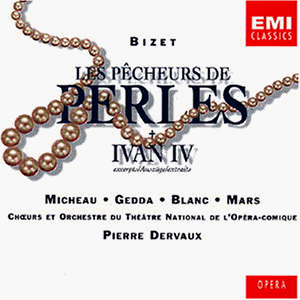
LINK: DOWNLOAD
Live performance from Leningrad (St. Petersburg), March 1980
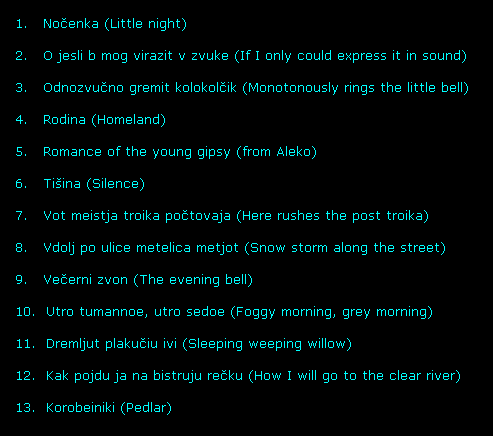
LINK: DOWNLOAD
1. I remember a wonderous moment
2. Islet
3. Amidst the noisy ball
4. From my window
5. Spruce and palm
6. Doubt
7. Why?
8. Lilac
9. Where are you, little star?
10. Do not sing, beautiful maiden
11. A dream
12. He-goat, a secular fairytale
13. What, beautiful maiden?
14. Ah, you deary
LINK: DOWNLOAD
Nicolai Gedda, Tenor
Rolf Leanderson, Baritone
Jan Eyron, Piano,1983
Aftonfrid
Sjung!
Under ronn och syren
Nattetid vid stranden
Om hosten
Varbacken
Bachi barn
Duellanterna
Gunnar Wennergerg (1817 - 1901)
Ur Gluntarne
En manskensnatt pa Slottsbacken
Uppsala ar bast!
Vid brasan pa magisterns kammare
Magisterns misslyckade serenad
Examens-sexa pa Eklundshof
LINK: DOWNLOAD
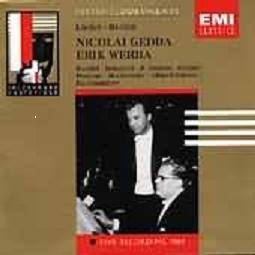
LINK: DOWNLOAD
Metropolitan Opera House
November 18, 1978
In English
Marenka..............Teresa Stratas
Jeník...................Nicolai Gedda
Vasek...................Jon Vickers
Kecal...................Martti Talvela
Ludmila.................Elizabeth Coss
Krusina.................Derek Hammond-Stroud
Háta....................Jean Kraft
Tobias..................John Cheek
Circus Barker...........Alan Crofoot
Esmeralda...............Colette Boky
Red Indian..............Andrij Dobriansky
Conductor...............James Levine
The old links were broken. Here are the new links:
LINK: DOWNLOAD
The files of the link are splitted files whichdon't work separately. You must join the parts with HJsplit (obtained at: http://hjsplit.en.softonic.com/ )
Les Vepres Sicilennes by Giuseppe Verdi
Drama in five acts (1855), to libretto of Eugène Scribe and Charles Duveyrier.
Monforte Sherrill Milnes
Bethune Robert Goodloe
Vaudemont Edmond Karlsrud
Tebaldo Nico Castel
Roberto Andrij Dobriansky
Elena Montserrat Caballé
Ninetta Cynthia Munzer
Procida Justino Diaz
Arrigo Nicolai Gedda
Danieli Douglas Ahlstedt
Manfredo Paul Franke
Chorus and Orchestra of the Metropolitan Opera House
Conductor James Levine
9 March 1974 New York Metropolitan
LINK: DOWNLOAD
Adina - Mirella Freni
Nemorino - Nicolai Gedda
Belcore - Mario Sereni
Il Dottore Dulcamara - Renato Capecchi
Conductor: Francesco Molinari-Pradelli
Orchester and choir Opera of Rome
Recorded in 1966.
LINK: DOWNLOAD
Joan Sutherland - Amina
Nicolai Gedda - Elvino
Ezio Flagello - Conte Rodolfo
Jeanette Scovotti - Lisa
New York Metropolitan Opera Chorus and Orchestra
Conductor.: Silvio Varviso
Live: 30. March. 1963
LINK: DOWNLOAD
01 Glinka Ivan Susanin Brothers in Arms
02 Tchaikovsky Onegin Kuda, Kuda
03 Tchaikovsky Pikova Dama Forgive me, you devine beeing
04 Tchaikovsky Pikova Dama Life is but a play
05 Rimsky-Korsakoff Sadko O you dark, shadowy wood
06 Mussorgsky Boris Godunov The cunning Jesuit
07 Mussorgsky The Mass of Sarotchin My heart, my poor heart
08 Rimsky-Korsakoff The Night in May The sun is sinking
09 Rimsky-Korsakoff The Night in May How calm, how marvellous the night
10 Rachmaninoff Aleko Over the flat grounds
Nicolai Gedda, tenor
Belgrad Philharmonic, conductor Gika Zdravkovitch
recorded 1969
LINK: DOWNLOAD
Benvenuto Cellini has been commissioned to do a statue by the pope. The pope's treasurer, Balducci, wonders why the pope employs such a "no good" Benvenuto Cellini. Cellini loves Teresa, Balducci's d daughter and visits her when Balducci is out of the house. Fieramosca, sculptor to the pope, who also loves Teresa, overhears Cellini persuading Teresa to elope. Cellini plans to disguise himself as a monk.
Scene 1. The Courtyard of a Tavern
Cellini and his fellow goldsmiths are having a drink, but are unable to pay their drinking spree. When Ascanio, Cellini's apprentice, arrives with gold meant as payment for the casting of a statue, Cellini uses it to buy more wine. Cellini and his friends plan to embarrass Balducci for sending such a meager payment. Fieramosca's friend Pompeo persuades him to thwart Cellini's plan and abduct Teresa himself.
Scene 2. The Piazza Colonna at the Corner of the Via Corso
Balducci and Teresa attend a play in the piazza. At Cellini's urging, the players parody Balducci himself. While the annoyed and angry Balducci creates a scene, Cellini and Fieramosca descend on Teresa, both disguised as monks. A fight takes place in which Cellini kills Pompeo, Fieramosca's friend. At the same time the cannon sounds, signaling the end of the carnival, and in the confusion Fieramosca is arrested for Pompeo's murder.
Ascanio brings Teresa to Cellini's studio. Cellini, who has escaped his pursuers by slipping into a chorus of real monks, joins them there. Balducci demands the return of his daughter, whom he has promised to Fieramosca. They are interrupted by the cardinal, who is furious that Cellini threatens to destroy the model of the statue. He gives Cellini an hour to cast the statue. Lacking sufficient gold to finish the job, Cellini melts down all his other creations. The statue is finally completed, the cardinal forgives Cellini and grants him Teresa's hand.
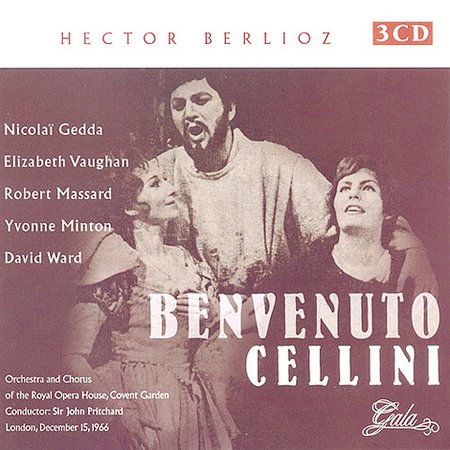
Benvenuto Cellini - Nicolai Gedda
Giacomo Balducci - Jules Bastin
Fieramosca - Robert Massard
Pope Clement VII - Roger Soyer
Francesco - Derek Blackwell
Bernardino - Robert Lloyd
Innkeeper - Hugues Cuisnod
Pompeo - Raimund Herincx
Teresa - Christiane Eda-Pierre
Ascanio - Jane Berbioli
Speaker - Janine Reisse
Conductor Sir John Prichard
Covent Garden, December 15, 1966
LINK: DOWNLOAD
LINK: DOWNLOAD
LINK: DOWNLOAD

GRÄFIN MARIZA - ANNELIESE ROTHENBERGER
FÜRST MORITZ DRAGOMIR POPULESCU - KURT BÖHME
BARON KOLOMAN ZSUPÁN - WILLI BROKMEIER
GRAF TASSILO ENDRÖDY-WITTEMBURG - NICOLAI GEDDA
LISA - OLIVERA MILJAKOVIC
MANJA - EDDA MOSER
KARL STEPHAN LIEBENBERG - HORST SACHTLEBEN
CHOR DER BAYERISCHEN STAATSOPER MÜNCHEN
SYMPHONIE-ORCHESTER GRAUNKE
WILLY MATTES, Munich 1973